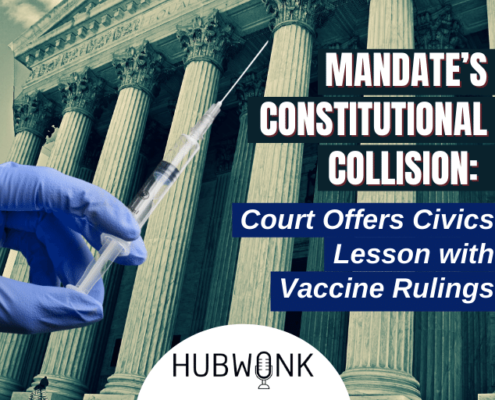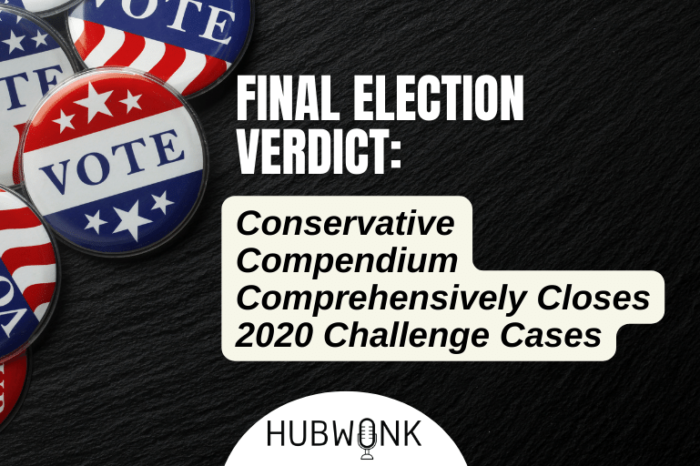Final Election Verdict: Conservative Compendium Comprehensively Closes 2020 Challenge Cases
/in Featured, Podcast Hubwonk /by Editorial Staff
This week on Hubwonk, host Joe Selvaggi talks with Ilya Somin, author and George Mason Law professor, about the newly released report on all court challenges to the 2020 presidential election entitled, Lost, Not Stolen, exploring what its authors intended to achieve, what its readers can learn from its findings, and whether such intra-party scrutiny can serve to reassure voters that their concerns about election integrity have had their day in court.
Guest:
 Ilya Somin is Professor of Law at George Mason University. His research focuses on constitutional law, property law, democratic theory, federalism, and migration rights. He is the author of his most recent book, Free to Move: Foot Voting, Migration, and Political Freedom (Oxford University Press, 2020, revised and expanded edition, 2021). Somin’s writings have been cited in decisions by the United States Supreme Court, multiple state supreme courts and lower federal courts, and the Supreme Court of Israel. He has testified on the use of drones for targeted killing in the War on Terror before the US Senate Judiciary Subcommittee on the Constitution, Civil Rights, and Human Rights. Before joining the faculty at George Mason, Somin was the John M. Olin Fellow in Law at Northwestern University Law School in 2002-2003. In 2001-2002, he clerked for the Hon. Judge Jerry E. Smith of the U.S. Court of Appeals for the Fifth Circuit. Professor Somin earned his BA, Summa Cum Laude, at Amherst College, MA in Political Science from Harvard University, and JD from Yale Law School.
Ilya Somin is Professor of Law at George Mason University. His research focuses on constitutional law, property law, democratic theory, federalism, and migration rights. He is the author of his most recent book, Free to Move: Foot Voting, Migration, and Political Freedom (Oxford University Press, 2020, revised and expanded edition, 2021). Somin’s writings have been cited in decisions by the United States Supreme Court, multiple state supreme courts and lower federal courts, and the Supreme Court of Israel. He has testified on the use of drones for targeted killing in the War on Terror before the US Senate Judiciary Subcommittee on the Constitution, Civil Rights, and Human Rights. Before joining the faculty at George Mason, Somin was the John M. Olin Fellow in Law at Northwestern University Law School in 2002-2003. In 2001-2002, he clerked for the Hon. Judge Jerry E. Smith of the U.S. Court of Appeals for the Fifth Circuit. Professor Somin earned his BA, Summa Cum Laude, at Amherst College, MA in Political Science from Harvard University, and JD from Yale Law School.
WATCH:
Get new episodes of Hubwonk in your inbox!
Read a Transcript of This Episode
Please excuse typos.
Joe Selvaggi:
This is Hubwonk. I’m Joe Selvaggi.
Joe Selvaggi:
Welcome to Hubwonk, a podcast of Pioneer Institute, a think tank in Boston. The echoes of the legal challenges to the 2020 presidential election are still with us today from the January 6th congressional hearings of an attack animated by concern over a stolen election to the 30% of Americans who have lost faith in election integrity. This vital to reassure everyone that every allegation of fraud or election wrongdoing be given its day in court now fully a year and a half after the election, with more than 60 legal challenges to the 2020 election heard in the six contested states, eight prominent conservative authorities have compiled a comprehensive list of the results entitled, lost, not stolen. The conservative case that Trump lost and Biden won the 2020 presidential election far from being dismissive of the need to scrutinize election integrity. When necessary the paper offers readers acknowledgement that there is a long record of legal challenges to election results to reassure losing candidates that they did.
Joe Selvaggi:
Indeed lose a fair fight. The paper compiles, all election cases and verdicts to argue that the losing candidates and their party’s leadership must embrace the final legal outcome to preserve and restore faith in our country’s democratic system. My guest today is Ilya Somin, author and law professor at George Mason University. Professor Somin has written extensively on the legal challenges to the 2020 presidential election. He will share with us his views on the lost, not stolen report. The stated intent of its authors, what the report includes and how readers can use its content to reassure themselves all legal concerns have been vetted, heard, and fairly adjudicated. Professor Somin will also discuss why the authors reputations as principled conservatives, many appointed by or allied with the Trump administration is so important for restoring faith in the process and moving forward to winning elections fairly when I return, I’ll be joined by George Mason university law professor Ilya Somin.
Joe Selvaggi:
Okay. We’re back. This is Hubwonk. I’m Joe Selvaggi and I’m now pleased to be joined by author and law professor at George Mason university Ilya Somin. Welcome back to Hubwonk, Ilya. Thank you so much for having me. Okay. Our conversation today is gonna be centered on a, a report just released, entitled, lost, not stolen. The conservative case that Trump lost and Biden won the 2 20 20 presidential election. I know that just the title may have either irritated or lost some of our listeners, but I want them to have a little bit of confidence, a little faith bear with us, listen to our conversation. Perhaps there might come away with some useful information. And I think we I’ve invited you on because you’ve written thoughtfully about this report. So let’s cover it in detail. Let’s start at the beginning and say, what was the purpose of this report that was just released?
Ilya Somin:
I’d say it has two purposes first to just provide a comprehensive and easily accessible overview of all the litigation generated by the 2020 election. And Trump’s charge that it was stolen from him. And it goes over all the cases and also all the allegations made by Trump and his supporters all in one place and then relatively accessible language to the extent that, you know, this kind of legal stuff can be made accessible. And I think that’s a real merit in that if you, if you’re a busy person and you’re not a specialist in these things, then, you know, it’s easier to access it this way than, you know, to look at all the individual materials in different places where, you know, might be a little bit hard to find. The second reason that this report is distinctive is the authors all are big name, conservative, legal luminaries.
Ilya Somin:
Three of them are former conservative, Republican-appointed federal judges Michael Lutig, Thomas Griffith, and Michael McConnell, two of them, Lutig and McConnell, were often seen as serious potential Republican nominees to the Supreme court. Then there are former senators John Danforth and Gordon Smith. Danforth, by the way is also the former attorney general of Missouri in which capacity he was actually a major mentor to Clarence Thomas. He gave Clarence Thomas, his first job out of law school. And Thomas worked for him for a number of years in a crucial stage in his career. The other authors are Ted Olson, who is a Republican, super lawyer as people in a professional like to call him. He’s also the former solicitor general under George W. Bush administration. The solicitor general is the person who represents the administration before the Supreme court and other federal appellate courts.
Ilya Somin:
And now he’s one of, sort of the biggest name, appellate lawyers on the conservative side also included our Benjamin Ginsburg. Who’s a prominent G O P election law expert and David Hoppe, who was a longtime aide to various G O P members of Congress. So these people are conservative Republicans and it’s worth adding that they’re also not never Trumpers. That is these are all people who remain affiliated with the Republican party. They say so themselves you know, they, they voted for the Republican party most, if not all of them probably even voted for Trump in the 2020 election though. We don’t notice for sure so that in their report, which to ruin the suspense concludes that nearly all of the charges raised by Trump were false and shows that the litigation of the election case had decisively proved that this was so it’s very difficult to ascribe just to say, well, these people are liberals, or even that they’re never Trumpers or to, you know, they secretly want the Republican party to fail. You know, it’s very hard to say that about these particular individuals. And it’s also hard to say that, you know, these are just unqualified people who don’t know what they’re talking about, given that they are as I mentioned earlier, big name legal luminaries.
Joe Selvaggi:
So they’re both credentialed as conservatives and legal experts, their bona fides is established. Is there any – you say they’re not “never Trumpers,” but have any of them written authoritatively against Trump or before this as revealing their never Trump sentiment?
Ilya Somin:
So I am not familiar with all of their writings and every issue, but certainly none of them have been prominently involved in any kind of anti-Trump activities to my knowledge, except for in the aftermath of January 6th, Mike Lutig who advised vice president Mike Pence during that time. And you know, was involved in trying to dissuade the effort to overturn the election. He has obviously been very critical of that and testified before Congress on it. But there’s no doubt that the man is a conservative Republican, and even this sequence of events has not led him to break with a Republican party.
Joe Selvaggi:
So okay. We’ve established who the authors are. What is the scope of this? I, I don’t know if you would call it an investigation, but this report, what, what was the scope of what was written in hi in this report?
Ilya Somin:
Sure. So it’s an overview of all of the cases 64 and all that were file filed either by Trump Trump’s campaign or by his supporters, such as the so-called “Kraken” lawyers challenging the election results and also an overview of the different charges that Trump made. Some of which, you know, did not make it into court. And it looks particularly at sort of the six crucial battleground states where all, where nearly all these cases were filed. And obviously everybody agrees where decisive to the election result. And it concludes that would perhaps one minor exception where the Trump side did prevail in court. All of these charges were rejected by the courts for good reason. And the reason being simply that there wasn’t any, anything re remotely resembling and adequate factual basis for them, it’s worth noting that in many cases, they were rejected by Republican appointed judges, including a good many who were appointed by Donald Trump himself.
Joe Selvaggi:
Indeed. now when we look at this analysis whether they’re dismissed or not, whether the, the cases were heard or not is, is this report looking at the, let’s say procedural flaws in these cases or the factual flaws. In other words, if I wanna make an allegation I can make a good legal argument or a poor legal argument, but the facts may be support me. I just didn’t represent them very well. Do
Ilya Somin:
Do you sure. So there are a total of 64 cases that they cover some in state court and some in federal court of those 30 actually did reach what warriors called the merits that is they rejected the actual arguments being made substantively in the cases were not dismissed on procedural grounds. 14 more were dismissed because the Trump campaign or other pro-Trump plaintiffs decided to withdraw the case after it was filed. And I would bet that in most, if not all of those cases would because they realized they couldn’t win. Then there were indeed some 19 or 20 cases that got dismissed on various kinds of procedural grounds. Do I would note that there are some instances where procedure has connection to substance, but there were a great many cases, including many cases heard by Republican appointed judges of various kinds that were heard onto merits or alternatively the pro-Trump side decided to withdraw the case in many instances, because they realized they couldn’t win onto merits.
Ilya Somin:
Indeed. the authors document, a bunch of cases where when you actually get into court, Rudy Giuliani, or some other pro-Trump lawyer there, the, the judge asked. So, you know, do you have evidence of voter fraud? If so, show it to us. I, no, this is not a fraud case. And obviously the reason that why they’re rhetoric in court diverges from their rhetoric outside of court is you say this outside of court in most cases, except in a few situations involving live Belinda, like you can say what you want, you’re protected by the first amendment. Whereas if you get into court and you lie to the judges then there are various sanctions that lawyers can come under. So if you look at how these cases went the pro-Trump lawyers were much more cautious in many instances in what they said in court than elsewhere in cases where they weren’t cautious and ended up losing some, these people, including the Cracken lawyers have actually come under proceedings where they may be sanctioned by the bars of their, of the various states involved. And that’s notable because as many legal member, the legal freshman will tell you in general, the legal profession tends to protect its own and is very reluctant to sanction lawyers. And so in cases where the lawyers do come under sanction, it’s usually because the conduct was extraordinarily egregious, as it in fact was in some these cracking cases.
Joe Selvaggi:
So you mentioned states not surprisingly these court cases came up in what we call swing states. Those that were close or reasonably close. I’m gonna rattle ’em off Arizona, Georgia, Michigan, Nevada, Wisconsin, and Pennsylvania. Some are let’s say lean, right? Some lean left, some have Republican legislators and some don’t I don’t know if you wanna get to this level of granularity. Can you characterize, let’s say how it went in each of those states if it was sort of a sympathetic audience or not you know we don’t have to go deep on each of the cases, but how would you characterize each state’s handling of these cases?
Ilya Somin:
So in each state while certainly details differed, almost every case ended up in a defeat for the pro Trump side, with the exception of one case in Pennsylvania, which turned out to involve only a small number of votes, not nearly enough to shift the, I think something like 180,000 vote margin in that state. I would note obviously that there were different officials handling things in different states, some on Republican officials, other democratic, but it’s worth noting that in the states of Arizona and Georgia where the state government was under to control of the Republicans, the executive branch, and also the legislature, nonetheless, the, you know, the results were much the same as in states where the Democrats had more influence like Michigan in Arizona and also in Georgia Republican election officials who had involved in audits or overviews of the votes concluded that you know, there was no, certainly no significant vote of fraud enough to overturn the results later in Michigan.
Ilya Somin:
The Republican members of the state legislature did an audit of the election results. This was after just a few months after the election, they put out a report which is cited in the report that we’re talking about. And their report concluded that while there were a few irregularities here and there there was nothing that could overturn the actually pretty large margin by which Biden prevailed in Michigan, in, at, in the state of Arizona pro-Trump forces actually hired the so-called. I think they’re called cyber ninjas which was a sort of a group of affiliated with consider Republican that they hoped they would find evidence of voter fraud in Maricopa county, which is Arizona’s largest after the ninjas completed their investigation. They actually found that in their view Biden one Maricopa county by a slightly larger margin than the official vote count indicates. So to the extent that there are worry irregularities and now critique for instance, on that they actually favored Trump. Do I should emphasize, we’re talking about only a few hundred votes that would not have you in a substantial indeed in the overall outcome.
Joe Selvaggi:
Indeed. The report is remarkably clear. It lays it out for layman like me which was very interesting. I hadn’t encountered this as cyber ninjas, just take Arizona as an example, they hand counted the votes three times. They found out of 2.1 million votes, 99 irregularities, and these are not fraud evidence of fraud, but rather balance that might not have been counted the same way on 100 out of 2.1 million. And as you say Biden actually increased his vote count by 10, 10 more after three hand counts. And the irregularly, the rate of irregular was at a smaller, lower percentage than historical irregularity. So I, I thought that was remarkable. What were the, you know, when we talk about irregularities what was the nature of, of what was alleged and what was found? For instance, you know, we all, we’ve heard of the dominion voting machines being manipulated items like that. What was sort of the general family of, of allegations and, and did some have more merit than others?
Ilya Somin:
So there was a whole enormous range of allegations, almost all, which had almost no merit. I can’t go over. ’em All. Although the report does, I’ll just mention a few. One was indeed that dominion voting machines or other voting machines were manipulated either by the Democrats or in some cases of the claim that it was, that it was done by Hugo Chavez, the dictator of Venezuela who passed away back in 2013 or by, or by North Korea, other foreign forces. And, you know, the, the, the the evidence on this is just simply that, you know, there’s just no evidence that it actually occurred. Indeed the accusation was so ridiculous. And so irresponsible that dominion has actually filed liable lawsuits against Rudy Giuliani and others who publicly made these accusations. And while such lawsuits are actually quite difficult to win dominion is actually well on its way to winning settlement to winning big judgment against Giuliani and others and such stations as news max have had to run obsequious retractions of some of the things they said on the air.
Ilya Somin:
So, you know, there’s just no merit to this one. In other cases, there’s accusations of voter fraud. Once again here, while in an election of with 160 million voters, you’re almost always gonna have a few cases of voter fraud. There’s just no evidence that it happened on anything like the scale necessary to turn to results. In still other cases, there are allegations of things like people violating procedural rules of elections, like voting in the wrong district, or mailing under ballots late. And the, like this again is the kind of thing that it’s gonna happen in some cases in pretty much any election. And it is true that there are a few instances where here you can argue and some in the court in Pennsylvania did conclude that some Trump’s allegations had some merit in particular in a case that made its way to the Supreme court, but ultimately wasn’t fully heard by them.
Ilya Somin:
There was a question of whether the state of Pennsylvania should accept several thousand mail in ballots that arrived after the deadline and Pennsylvania officials already answered that should be accepted. The Republican party said no. Ultimately the Supreme court never fully resolved this issue because the number of votes, a few thousand of them was nowhere near enough to overturn Biden’s margin in Pennsylvania, which was something like 20 times as great as that. And it wouldn’t be enough, even if every single one of those votes was a vote for Biden, which in fact it was not, there were some that were votes for Trump. And then obviously there are some examples of things like people voting in the wrong district or claiming to be registered in the state or residents of the state, even though they actually weren’t, again, with 160 million voters, such cases happen in almost every election, there were nowhere near enough of them in this instance to make any difference in, in any state or even to make a decisive difference, even in one precinct within one state and of such few cases like this that have been found some of them, you know, actually were people who cast Republican ballots, including ironically it may be that Mark Meadows, Donald Trump’s chiefs of staff voted in Virginia illegally because he wasn’t, he may actually not have been a genuine resident of Virginia at the time.
Ilya Somin:
Though I should emphasize it’s possible. He just legitimately screwed up. Many of these kinds of procedural screw ups are just honest mistakes either by people just don’t know the details of the laws, which can be complicated or in Meadow’s case, perhaps, you know, he’s a busy guy, he simply didn’t have the time to, you know, to look into this or, you know, to get his lawyer to do so.
Joe Selvaggi:
So I’m gonna be the devil’s advocate talking with another professional advocate and say, does the, does the absence of evidence mean evidence of absence? In other words, for our listeners saying, look, these these lawsuits didn’t uncover any wrongdoing. That doesn’t mean it didn’t happen. How can our listeners be sure something wasn’t overlooked?
Ilya Somin:
Yeah. So it’s almost certain that something somewhere was overlooked. Because as I said before, in an election with 160 million voters, it’s imp, there’s always gonna be some irregularities and it’s impossible for anyone to find every single one, what your listeners or really anybody should be concerned about is not whether there were some irregularities somewhere, but whether they were of a scale such that they shifted the outcome of the election or even came close to it. And there the absence of evidence really is telling, because what we are talking about in order to shift the outcome of the election is tens of thousands, or really hundreds of thousands of votes spread across four, at least three or four states. We’re we be talking about sort of a massive operation of fraud or deception or something of that sort or voting machine manipulation.
Ilya Somin:
However you want to posit it would require an enormous operation that would we even evidence trail. And when you have an organization as large and wealthy as Republican party, looking for that evidence and having a very strong incentive to find it, if they nonetheless failed, find anything, even remotely into ballpark of what is needed to prove this that’s pretty good evidence that it didn’t happen, or at least it didn’t happen anything like the scale that would be necessary to shift an elector outcome. I would also add a point here sort of about the general competence of government that in general government is not that good sort of, you know carrying out large complex operations and then keeping them completely secret. As we’ve learned in recent years, even with things like military and diplomatic operations, they have trouble. It seems to me virtually impossible that a whole bunch of different state local and federal officials were able to pull off this kind of operation on a massive scale involving hundreds of thousands of votes, and yet leave virtually no evidence behind I just don’t believe that our state, federal and the local governments have that kind of confidence.
Ilya Somin:
And I would add also that in order to do it, you would’ve had to have many thousands of people cooperate involved in the operation, and it would be virtually impossible to ensure all of those people would keep quiet, or even if they were trying to keep quiet, it would be virtually impossible ensure that none of them wouldn’t slip up and, you know, let the cat out of the bag, so to speak. So if like many of Trump supporters or for that matter, many Americans across the political spectrum, you’re generally suspicious of government’s competence. And don’t think that it, you know, that it operates very efficiently. It’s a kind of a contradict to say in general, government isn’t very competent or efficient. They have trouble doing things like delivering the mail, but the one thing they can do really efficiently is bring off a massive conspiracy involving hundreds of thousands of votes, and then keeping it completely secret even if they wanted to do this I just don’t think that they could and the attempt to do so would certainly be found out the Republican party would have strong incentives to find the evidence and judges, particularly Republican appointed judges would have strong incentives to give serious consideration to that kind of evidence.
Ilya Somin:
And to rule in favor of the plaintiffs if indeed they could have presented it. Unlike what happened in the real world, where when judges, including Republican appointed judges asked for the evidence often the answer’s like, well, we didn’t really mean to say that there was actual fraud. We’re just saying, you know, there might be some irregularity somewhere of some kind.
Joe Selvaggi:
So I, I, I agree. I, I’m just gonna lo you can gimme a short answer and say, okay nevertheless, we did have these lawsuits by competent in one hopes competent and, and qualified legal minds. Do you think these lawsuits the pro-Trump lawsuits were motivated by a genuine sincere belief there may have been irregularities, or would you take a more cynical view and say they were malicious or frivolous in their intent and a short answer is, well, I, I, I suspect I know the answer.
Ilya Somin:
Yeah. So I think there’s variation from case to case. There were a few cases that had Sam merit, or at least you can plausibly argue. They could nonetheless the operation as a whole was driven by a combination of cynicism and wine, or at best deep ideological and partisan bias that prevented people from seeing the truth. And that’s why a good, many of the lawyers involved in this are now facing sanctions, which is highly unusual. And that’s why when they got into court, in many instances, they were just laughed out of court, including by Republican appointed judges. It’s certainly true. As I tried to emphasize before then, virtually any large scale election, you’re gonna get some cases of irregularity. But the usual practice is not to pursue the litigation to the hill, unless there’s a real chance you could overturn the result.
Ilya Somin:
The margin in this election was actually pretty similar to the one that occurred in the 2004 presidential election or in 2012. And the charges here were on par with the democratic charges that older listeners may remember where, you know, some people said, well, Bush stole the 2004 election in Ohio by rigging or manipulating the voting machines in that state. And a few people on the left, like RFK Jr. For example spun various conspiracy theories that this happened indeed battering. It was actually even slightly less ridiculous than the ones in this election because in that election, everything really did turn on Ohio. Whereas in this one the Republicans would’ve had to flip at least three states in order to prevail. Fortunately in 2004, the democratic candidate, John Kerry, didn’t give credence to these kind of conspiracy tales and he quickly conceded the election. So it was left to sort of a left wing fringe to carry us on Bunia unfortunately Donald Trump behaved less responsibly. And so ridiculous. Conspiracy theories got more of a purchase into public imagination than happened back in 2004.
Joe Selvaggi:
Well, I’m glad you point to incidences where other, other parties and other candidates have, have experienced at least the conspiracy theories of their own you’ve written extensively indeed long before Trump came on the scene. I think it was back in 2013 or 14, 15 in your book. And you’ve written about rational ignorance that many voters have. And essentially why it is that voters are vulnerable to these conspiracy theories. You mentioned several of them in just the last two decades. What is it about voters that they are susceptible to being persuaded by whether they’re they’re charismatic leaders or mischievous minions. Why do people, why are people susceptible to conspiracy theories?
Ilya Somin:
I think there is two fundamental reasons which I discussed in my book and perhaps another one, which I didn’t cover as much the book for what it’s worth is democracy and political ignorance. I wrote it back in 2013 or published it then and there’s revised edition in 2016, but all written before this wait run of conspiracy theories. One reason is simply that most voters for what economists call rationally ignorant, that is for perfectly understandable reasons. They have very little incentive to spend more than minimum amount of time and effort seeking out political information because if your only reason for doing so is to be a better voter. That’s not much of an incentive at all, given that the chance your one vote will make a difference to elector outcomes is infinitesimally small about one in 60 million in a presidential election, for instance.
Ilya Somin:
So most voters, the data show actually know very little about government and politics. And if you know, little about how government actually works, that makes you more susceptible to sort of conspiracy theories among other things you may not think about the fact, you know, is government actually competent enough to carry out this conspiracy, what would be required for it to actually happen or actually succeed and so on. But there’s also another source of this problem, which is related to ignorance, but distinct. And that is that for the very same reason, the voters have little incentive to be well informed. They also have little incentive to think carefully about the validity of the information they do here and to check their biases. We, all of us we tend to be more accepting of information that reinforces our preexisting views than goes against them that happens in every aspect of life.
Ilya Somin:
But in other aspects, you know, if we hear about a deal, that’s too good to be true that, you know you know, that’s, that’s emailed to us for something like a Saudi prince who says, I’m gonna give you a million dollars. You have some incentive to be skeptical about that and not to be drawn in on the other hand with political information, precisely because there’s very little incentive to work hard, to make a good decision at the ballot box. People tend not to do a good job of controlling their biases, and therefore they’re susceptible to misinformation and conspiracy theories that reinforce their preexisting views and that support their partisan biases, which is why it’s not at all surprising that most of the believers in Trump’s big. Why about 2020 election are partisan Republicans contrary wise, most of the believers in the conspiracy theory that Bush around the 9/11 attacks to happen deliberately so-called 9/11 truth believers in that were and are overwhelmingly partisan Democrats.
Ilya Somin:
And in both cases, people were sort of applying low evidentiary standards to claims that reinforced their partisan biases. This happens on both the left and the right, but you know, the aftermath of the 2020 election is a particularly egregious example of this bipartisan phenomenon. And finally, I think the phenomenon is more likely to occur, or at least it will affect more people in situations like the present when things are deeply polarized. And therefore we’re more reluctant to accept the legitimacy of the op the opponent’s victory than we would in a case where we felt like, you know, there’s not that much difference between a Democrat or Republicans. And therefore we don’t feel like the other party winning is, you know, adapting a deal.
Joe Selvaggi:
Indeed. the best joke I’ve heard about this whole conspiracy thing is that a guy and his wife die and go to heaven and they, they talk to God and they say, you know, now that I’m here who really won the 2020 election, and God says Biden one fair and square. And the guy says to his wife, wow, this conspiracy goes higher than I thought.
Ilya Somin:
Sure. Yeah. So an omnipotent guide could indeed bring off a conspiracy like this, the distinctly non omnipotent politicians and bureaucrats that we actually have. It’s much more unlike
Joe Selvaggi:
Now, given as you, you just noted the, the increasingly partisan nature of news and institutions in general, how does one, you know, our listeners sitting there thinking they’re uneasy, maybe they feel like they’ve been part and drawn into this conspiracy. How does one really inoculate oneself or protect oneself from being seduced by, by conspiracy theories?
Ilya Somin:
Yeah, there’s no perfect remedy. And obviously, as I noted before, voters actually have strong incentives to not wanna be cured of this particular disease, if you want to call it that you know, because of the dynamics mentioned earlier. But if you do want to avoid it, I would note sort of two kinds of things. One is just be, be wary of elaborate conspiracy theories generally, be afraid because I mentioned before, it’s unlikely the government has the competence to bring them off, at least not liberal democratic government in the us and other Western democracies. Secondly pay attention to situations where there is a pretty broad cross ideological consensus of experts. So if experts are split along left versus right lines then you know, that’s maybe some evidence that the experts are suffering from ideological bias, just like everybody else, you should still pay attention to them, but their opinions are less probative.
Ilya Somin:
They might be elsewhere. If on the other hand, there is a pretty broad cross ideological consensus of experts. Then it’s worth giving that at least some deference and on this issue there is overwhelmingly people who actually know a lot about you know, the mechanics of voting in elections and the relevant, legal doctrines and so forth. They tend to agree with what was said in, in this report that we’re talking about including of course, the prominent conservatives who authored the report itself. And then finally you know, just be aware of your own biases. If you’re a liberal Democrat, you’re likely to be more susceptible to of liberal, democratic, conspiracy monitoring and misinformation. And similarly, if you’re a concerted Republican, your biases are gonna be the opposite. If you’re a libertarian like me, you have, you’re gonna have some biases of your own. So you can’t completely protect against those biases, but you should at least know where they are. And therefore you should worry much more about yourself being taken in by conspiracy theories or misinformation that support your preexisting views than being taken in by misinformation, by your partisan or ideological enemies. Of course, sadly, actual partisans tend to worry much more about that second scenario, even though it’s actually much less likely
Joe Selvaggi:
Indeed. It’s easy for us to see the conspiracies on the other side, not our own. Now the our listeners may dismiss both this report and perhaps our conversation is somehow having a, a bias against Donald Trump. But actually the authors go to great lengths to say they have no malice towards either Trump or his voters. Nevertheless if indeed, either Donald J. Trump knew the big lie was indeed a lie or didn’t that would damage his reputation and certainly his prospects, his political prospects in the future. Wouldn’t this report if it were embraced and understood and accepted by Donald Trump’s party, the Republican party, wouldn’t it make the prospects for his renomination far less likely and therefore somewhat damaging.
Ilya Somin:
So I think certainly his promotion of the big, why should be damaging to Trump though, the partisan dynamics that I mentioned earlier, at least so far have made the damage less severe than might otherwise be the case. But I would also say that I am less forgiving than the author of the report. I think he does in fact, deserve severe blame for what he did. Either he knew that he was lying about this stuff or he was negligent in his evaluation of information, which is still reprehensible. If you’re to president the United States, you’re not, I can, I can forgive some guy, you know, who’s busy and has little time to pay attention to what’s going on in politics. And therefore just unthinkingly let their prejudice has run wild. When you’re the president the United States, you have a higher responsibility than that.
Ilya Somin:
And you certainly can’t say, you know, I was busy doing something else, so I didn’t have time. And I would note that what is in this report is more or less the kind of thing that was told to him by his own knowledgeable advisors, including his attorney general Bill Barr who if anything, is even more rock rib conservative in most ways than you know, the authors of this report. So I think while it’s reasonable to be forgiving of, you know, rank and file Trump supporters, much less forgiving of Trump, himself and other politically elites who were involved in this.
Joe Selvaggi:
And so we’re getting close to the end of our time together. I really appreciate your time, but sort of as a philosophical matter, do you see, is it disloyal when your party does go down this path towards conspiracy and challenge the results of election, is it disloyal to be critical of one’s own party and call them out, or do you think ultimately in the long run, the party is stronger if it identifies where its own members, its own leadership have gone astray and really forsaken the values and the principles of the party what is your personal view?
Ilya Somin:
So I think people’s ultimate loyalty should be to the principles on which the constitution and the United States were founded on and which we’re trying to achieve a particular political party deserves loyalty only in so far as it’s in accordance with those principles. And when it starts to undermine them by promoting conspiracy theories, violating people’s rights or engaging in any other kind of heinous conduct misplaced loyalty to the party should not prevent people from speaking out any more than loyalty to the mafia or something like that should prevent people from condemning you know, crime bosses when, you know, when, when they do things that are wrong, loyalty indeed has to be earned and the right to it can be lost
Joe Selvaggi:
Indeed three cheers for integrity and principles. Let’s hope we, you and I are not blinded by our own conspiracy theory. So thank you very much for this thoughtful analysis of this report. Where can our listeners find the report and read it for themselves independent of our interpretation.
Ilya Somin:
So if you Google the title of the report you can find it, you can also find links to it in the blog post about it that I put up earlier today at the VO conspiracy blog, V O L O K H at the Reason magazine website. But in general, the easiest way is just to Google the title of the report it’s available for free, and you can download it
Joe Selvaggi:
And wonderful. And I think also if our listeners go to your volokh conspiracy blog, they can also find you and even reference some of the books that we mentioned and catch up and read your excellent work that you’ve written. So thank you very much for being on Hubwonk again, Ilya. I really appreciate your time.
Ilya Somin:
Thank you so much.
Joe Selvaggi:
This has been another episode of Hubwonk, a podcast of Pioneer Institute, a think tank in Boston. If you enjoy today’s episode, there are several ways to support Hubwonk and Pioneer. It would be easier for you and better for us. If you subscribe to Hubwonk on your iTunes podcaster, it would make it easier for others to find Hubwonk. If you give us a five-star rating or a favorable review, we’re always grateful. If you wanna share Hubwonk with friends, if you have ideas or comments or suggestions for me for future episode topics, you’re welcome to email me at hubwonk@pioneerinstitute.org. Please join me next week for a new episode of Hubwonk.
Recent Episodes
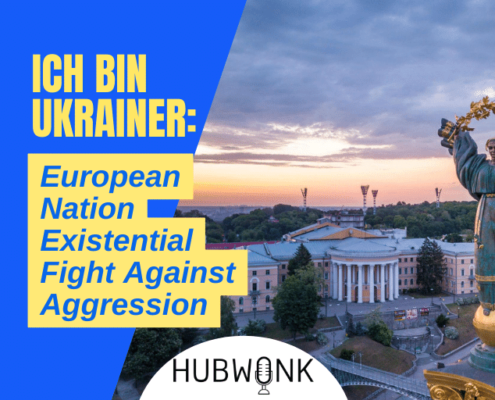
Ich Bin Ukrainer: European Nation Existential Fight Against Aggression

Successful Aging Support: Reimagining Effective and Affordable Long-Term Care Solutions

Pandemic Dead Reckoning: Unseen Casualties of Public Health Interventions

Olympic-Scale Doctor Shortage: Tapping International Talent

Transit Innovation Explored: A Bus As Fast As A Train?
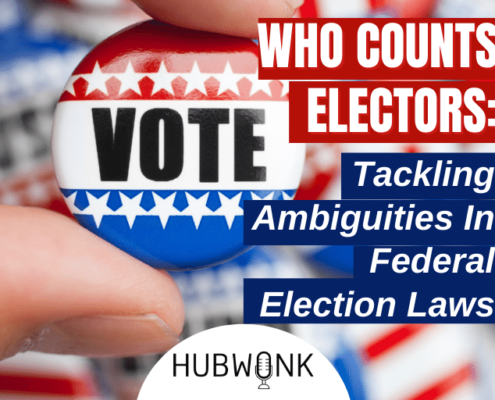
Who Counts Electors: Tackling Ambiguities In Federal Election Laws
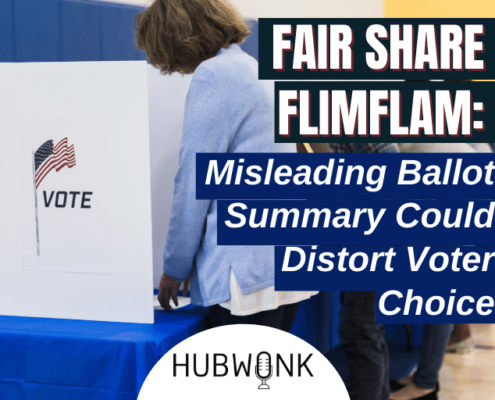
Fair Share Flimflam: Misleading Ballot Summary Could Distort Voter Choice
